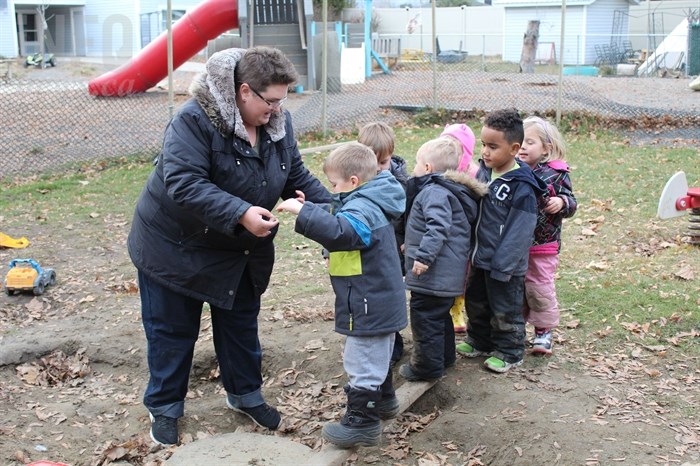
Early Childhood Educator Emily Siegrist plays with children at the North Shore child care facility on Wednesday, Nov. 21.
(KAREN EDWARDS / iNFOnews.ca)
July 21, 2019 - 7:00 AM
KAMLOOPS - Laura Doan, an assistant professor at Thompson Rivers University, has spent years researching, teaching, and supporting early childhood educators.
Now she's going to be able to do even more, having received a grant of $575,000.
It will be used to set up locations in 19 communities where early childhood educators can gather, share their experiences, discuss potential advancements, and have a sense of community support. It is a part of the province’s three-year $6.3 million investment into a variety of programs for early childhood educators.
“This is typically an under-researched group in our society, so we really want to learn from educators and be able to share their voices and their stories,” Doan says. “Each community of practice will also receive some funding for professional development, so they can look at what the needs are of that particular community.”
There will be one location in Kamloops, and some set up in the Okanagan, which Doan believes will be in Kelowna and Vernon. Tofino, Vancouver, Vancouver Island, Terrace, Dawson Creek, Prince Rupert, and other locations are also set to see the program, all of which will open in September.
“In addition, this is a research project. The educators will be taking part in sharing their experiences about the project so we can hear more about their experiences and stories. We can find out what needs to be changed or tweaked for the future,” Doan says.
Doan notes that currently, early childhood educator programs are quite short, with Thompson Rivers University offering a diploma earned in a year and a half. Additional post-diploma certificates are available if the student chooses to extend their learning.
“New educators said they want to have some kind of program of support to help with the fact that they found the work overwhelming, yet deeply satisfying,” Doan says.
Doan says that she works closely with childcare centres in Kamloops, and receives requests for potential hires regularly.
“I work a lot directly with directors of these programs and I hear from them almost every week saying that there's a shortage and there looking for someone,” Doan says. “There is definitely a need for educators. There are some programs that are just waiting for more staff.”
The problem of accessible childcare is an issue across the province, but initiatives are being planned and tested to improve the industry, with one Kamloops location piloting the $10 A Day childcare project, which is at capacity.
Maureen Doll, co-ordinator of Kamloops Community Response Network, connects families with agencies and childcare providers. She has seen many people struggle to find childcare, who then find any means necessary to ensure the child is cared for.
“We've had several people coming in crying that they can't go back to work and they've been looking for childcare since their baby was born,” Doll says. “Some families are not going back to work. Other families are moving communities. Some families are putting their children wherever they can get.”
Doll mentioned that although registered childcare spaces may be available, the demand for early childhood educators is so high that childcare centres can't meet the mandatory child to educator ratio.
“One of the reasons they aren't full is because they can't find staff. Staffing is one of the biggest issues in childcare,” Doll says. “I have the sense that any qualified early childhood educator who wants to be working on the floor in childcare is working on the floor in childcare.”
Emily Gawlick, executive director of Early Childhood Educators of B.C., says that a lack of investment over decades has contributed to our childcare situation.
“Canada still ranks last on national spending in the early years. We don't come last by a little bit, but by a lot. All the developed countries spend way more money than Canada, they have way more access to programs and services when children are younger, and so I think that's been a huge injustice,” Gawlick says.
Gawlick says wage, benefits, and pensions are all key aspects in ensuring that early childhood educators feel respected and valued. She worries that people who care about childcare and education are pushed away from the field for monetary reasons.
“People come into this sector and they are passionate about making a difference for children and families. They feel this is where they excel,” Gawlick says. “I was out in Surrey six months ago, there was a lady there who had her (early childhood educator certification) and she said, ‘This is my passion, this is my desire, but I couldn't raise my family on this, so I had to go and learn how to be a truck driver.’”
Gawlick says that the current funding is one step in moving towards a solution for the complicated issue.
“I think to have a universal system here in B.C., we need to have multiple strategies rolling out at the same time,” Gawlick says. “This is one of them that will help educators to connect and hopefully stay in the field for much longer than they have in the past.”
— This story was corrected at 9:54 a.m. Monday, July 22, 2019, to correct the spelling of Laura Doan's name.
To contact a reporter for this story, email Jenna Wheeler or call (250) 819-6089 or email the editor. You can also submit photos, videos or news tips to the newsroom and be entered to win a monthly prize draw.
We welcome your comments and opinions on our stories but play nice. We won't censor or delete comments unless they contain off-topic statements or links, unnecessary vulgarity, false facts, spam or obviously fake profiles. If you have any concerns about what you see in comments, email the editor in the link above.
News from © iNFOnews, 2019